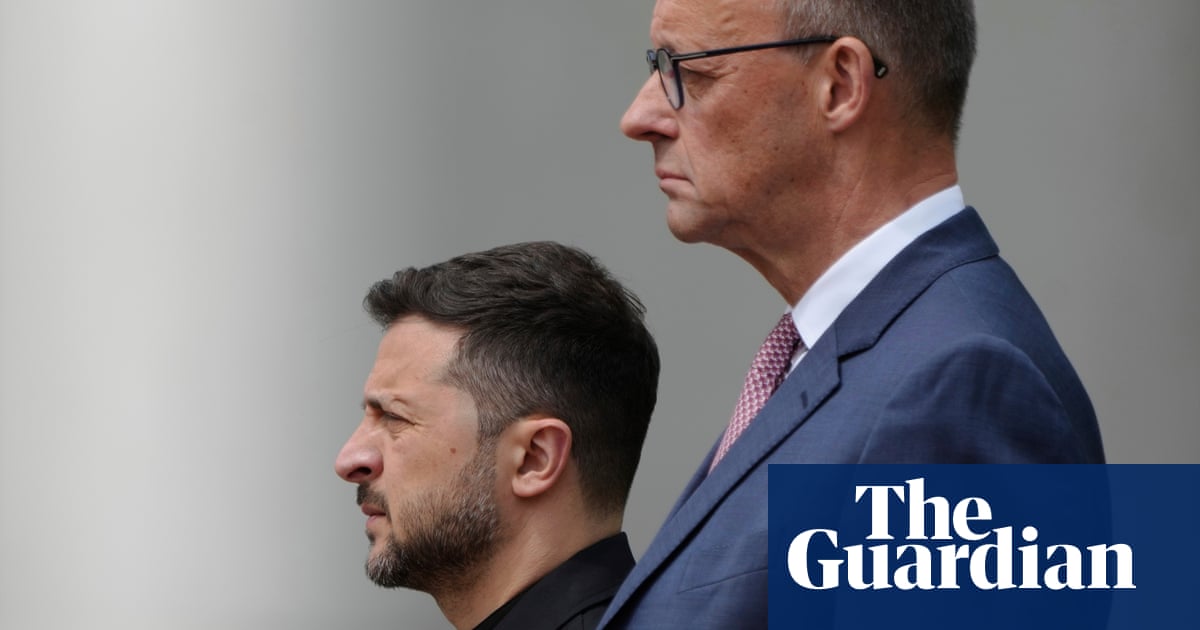Volodymyr Zelenskyy has said Russia has amassed 50,000 of its troops in the Sumy region before a planned large-scale offensive. The Ukrainian president and the German leader, Friedrich Merz, have convened for an ‘emergency meeting’ in Berlin.
Zelenskyy said Russia’s “largest and strongest forces are right now at the Kursk front in order to push our troops out of the Kursk region and to prepare offensives against the Sumy region”.
Zelenskyy said the government in Kyiv had undertaken steps to prevent Russia from carrying out wide-scale attacks in the area that borders the Russian oblast of Kursk, where Ukrainian troops carried outa surprise seizureof territory last August using drones and heavy western armaments.
Germany’s freshly appointed chancellor received Zelenskyy in Berlin amid expectations he will announce new plans to aid Ukraine. Merz welcomed Zelenskyy with military honours at the chancellery building in the German capital.
The visit will focus on Germany’s continued support forUkraineas well as efforts to bring about a ceasefire in the three-year-long conflict, the government spokesperson, Stefan Kornelius, said. Berlin is one of Kyiv’s main backers, a course that Merz, who came into office last month, has promised to continue.
There has been heightened speculation that Merz will promise to deliver longer-ranged weapons systems to Ukraine, such as Taurus missiles, after he said on Monday there were no longer any limits to the range restrictions on the weapons Germany sends to Kyiv to defend itself against Russia.
However, the German government has since sought to clarify its position, saying these range restrictions had already been lifted.
Merz is expected to offer his Ukrainian counterpart a multibillion euro package including additional air defence capabilities, more weapons and financial aid with which Ukraine can buy US military equipment. It is unclear whether the package will be in addition to the €3bn (£2.5bn) in aid already agreed in March by the outgoing government.
There are also expectations that a longer-term approach to helping Ukraine will be adopted. This would probably include Berlin supplying Ukraine with the technical components necessary to build and maintain its own long-range weaponry, including rockets and cruise missiles. This would enable Kyiv to defend itself more effectively without Berlin having to be concerned about being labelled a “war monger”. This in turn would make support for Ukraine more palatable to Merz’s domestic audience, among whom there is concern about Germany being dragged into a wider-scale conflict.
Before the meeting in Berlin, Russia’s foreign minister, Sergei Lavrov, called Merz’s plans to build thestrongest armyin Europe “very worrying”. Speaking at a security conference in Moscow, Lavrov said the announcement was reminiscent of “the periods of the previous century when Germany twice became the leading military power and how much trouble this brought”.
Sign up toThis is Europe
The most pressing stories and debates for Europeans – from identity to economics to the environment
after newsletter promotion
Zelenskyy and Merz are due to hold a press conference at 1.30pm local time before meeting German business leaders to discuss plans to rebuild Ukraine.
According to Zelenskyy, Ukrainian troops have in the past two days pushed Russian troops back by about 4km. Russia recently seized four border villages and has been advancing for the past few weeks towards the frontline Donetsk region in eastern Ukraine, close to the town of Kostiantynivka.
According to Russian media reports, Ukraine attacked two drone factories overnight, one on the north-western edge of Moscow, the other in the town of Dubno, about 80km north of Moscow. There was no information about casualties or the extent of the damage caused.
Russia’s defence ministry said that 296 Ukrainian drones had been intercepted over Russian territory. The reports could not be independently verified. Air traffic at Moscow airports and in other towns and cities had to be temporarily suspended, authorities said.
In Ukraine, eight people were injured in a Russian attack in the region around the city of Kharkiv, as reported by regional authorities, after Russia fired five ballistic missiles, according to the Ukrainian air force.
